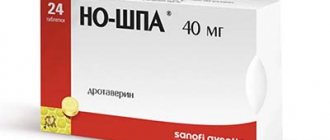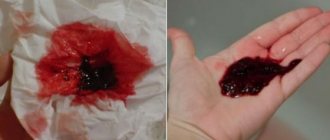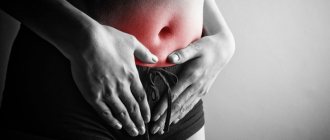Are blood clots during menstruation normal?
Every month, the reproductive system produces an egg, which goes through all stages of development, and at the moment of ovulation it becomes ready for fertilization. The hormonal system and reproductive organs prepare for pregnancy, as a result of which the inner layer of the uterus, the endometrium, thickens. If a woman carefully protects herself, conception does not occur. Levels of certain hormones begin to decrease.
Under the influence of hormones, the blood supply to the uterine cavity also decreases. The endometrium is rejected as unnecessary and leaves the reproductive organ through the genital tract. In other words, menstruation is coming - a muco-blood mass with endometrial particles. Menstrual flow should not be too thin.
When studying the question of why menstruation occurs with blood clots, we will immediately consider the phenomenon from the normal side. In most cases, they are released after a change in body position. If a woman lies or sits for a long time, the blood in the uterus stagnates and slowly coagulates. But after she gets up and moves around the room, the discharge quickly comes out with clots. This is fine.
It is also necessary to take into account that on critical days the body produces enzymes whose properties are similar to anticoagulants. During moderate menstruation, they reduce the rate of blood clotting. With heavy discharge, specific enzymes do not have time to cope with their functions, and menstruation occurs with clots.
https://youtu.be/AoxX5dR8R-s
Blood clots during menstruation as a sign of pathology
If menstruation occurs with large blood clots that resemble liver, and menstruation itself resembles bleeding and is accompanied by severe pain, this indicates a deviation.
Let's consider the main reasons for this negative phenomenon.
- Poor blood clotting. Blood quickly clots in the uterine cavity, because the necessary enzymes do not act.
- Intrauterine device. The body mistakes a mechanical contraceptive for a foreign body. Unusual conditions affect the nature of the discharge.
- Ectopic pregnancy. In addition to thick bloody discharge, the woman is bothered by pain in the lower abdomen and hyperthermia.
- Childbirth/abortion/curettage. The first menstruation after childbirth or surgery can be pathological. The size of the clots reaches a length of 12 cm. Copious thick discharge can leave the body against the background of elevated body temperature. In this case, you need to consult a doctor and examine the uterus. It is possible that particles of the placenta remained in the cavity. Now you know why large blood clots come out during menstruation.
- Uterine fibroids. The development of a benign tumor in the main reproductive organ disrupts the stable cycle and makes monthly discharge abundant and thick.
- Hormonal disorders. An incorrect balance of hormones makes menstruation irregular, intense, and thick. Sometimes the discharge is brown in color.
- Endometriosis. Hyperplasia, that is, abnormal growth of the uterine mucosa, often leads to the presence of large blood clots in the menstrual flow. The causes of endometriosis and blood clots during menstruation are endocrine disorders, including obesity and diabetes, and hypertension.
- Incorrect structure of the internal genital organs. The development of a girl's genital organs begins in the prenatal period. Improper formation of the structure distorts the body of the uterus, causing it to become unicornuated, bicornuate, curved or saddle-shaped (there may be other anomalies, for example, an intrauterine septum). Such deviations disrupt the contractility of the uterus during menstruation, so bleeding increases and clots come out.
- Oncological diseases. Malignant neoplasms in the organs of the reproductive system provoke bleeding with clots in different phases of the cycle.
- Iron-deficiency anemia. Insufficient iron in the blood leads to decreased hemoglobin levels. Hemoglobin is a protein responsible for supplying cells with oxygen. A deficiency of the substance disrupts the functioning of the body and leads to weakness, nausea, dizziness and painful periods. Clots 2–4 cm in size are visible in the discharge.
- Ovarian cysts. Enlarged ovaries with cyst-like formations cause pain and discomfort. Unpleasant sensations intensify during sexual intercourse. Functional cysts distort the hormonal status and prolong the 2nd phase of MC. Bleeding becomes irregular. When menstrual periods begin, the discharge is abundant with clots.
- Endometrial polyposis. The growth of the inner layer of the uterus occurs according to the formation of polyps. The disease causes pain in the lower abdomen and menstruation with clots.
- The use of drugs that accelerate the onset of menstruation. When menstruation is delayed, some women, without consulting a doctor, take Duphaston, Norkolut and other pills that speed up bleeding. The appearance of clots during menstruation in this case is due to the fact that the delay did not occur due to progesterone deficiency.
Heavy bleeding with clots on menstrual days can worry a woman with infectious diseases of the pelvic organs. Also, the consistency of discharge is affected by excess vitamin B and insufficient fluid intake.
What is the danger of menstruation that comes with clots?
The presence of small single blood clots is allowed in menstrual discharge. But if dark pieces come out, accompanied by additional symptoms, you need to consult a doctor for clarification.
It is strongly recommended to visit a gynecologist if:
- Worried about dizziness.
- Body temperature fluctuates between 37.5 – 40°C.
- Outside of menstruation, brown discharge appeared.
- Severe pain and other discomfort occurs in the abdomen.
- There is a pre-fainting state.
- Heavy menstruation lasts longer than 7 days.
- My period started on time, but it comes with large brown-black clots and my stomach hurts a lot.
- During all critical days, blood loss exceeded 150–200 ml (in one cycle).
So why are blood clots during menstruation dangerous? They may be a sign of an ectopic pregnancy, a dying polyp, or another life-threatening condition.
If a woman is planning a pregnancy, unusual menstruation should alert her. Pieces in menstruation indicate that the fertilized egg cannot fixate in the uterine cavity.
If the fertilized egg develops in the fallopian tube, the woman will feel a nagging pain in the right or left side. Sometimes the pain symptom does not appear until the fallopian tube is stretched and completely ruptured. Its contents enter the peritoneum and provoke septic shock. In the absence of urgent medical assistance, the woman dies.
If, during menstruation, not only clots come out, but also the above symptoms appear, you should definitely consult a doctor, regardless of your age and desire to have offspring. Problematic discharge may indicate a serious medical condition.
Diagnosis of pathological menstruation begins with a study of blood clotting and determination of hemoglobin levels. Leukocyte counts will help the doctor verify the presence/absence of an inflammatory process. The patient also undergoes blood tests for hormones and antibodies. The second analysis will help identify infectious agents. If there is a suspicion of cancer, the patient is tested for tumor markers.
Duration and abundance of menstruation
If a woman experiences heavy periods on the first day of her period, there is no need to worry too much. In this case, it is not necessary to take medications and other medications, since nothing other than disruption of menstruation will be achieved.
The best way out is to replenish the body with the required amount of nutritional components, vitamins and minerals, that is, those substances that are excreted from the body together with the blood. If at the same time a woman experiences severe exhaustion of the body, pain symptoms and other discomfort, then it is important to immediately see a specialist. An experienced doctor will conduct a thorough examination and treatment that will help quickly reduce sensitivity during painful periods.
On the first day of menstruation, the amount of blood is usually much greater than on the following days. Trying to quickly stop menstruation is only necessary when uterine bleeding begins.
https://youtu.be/irw2FZTu8Wc
Physiological norm of blood loss during menstruation
Every woman should know the norm of monthly bleeding in order to identify pathologies in time and begin treatment if necessary. The volume must be considered individually, based on the physiological characteristics of the body.
On average, this value ranges from 25 to 50 g per day. This means that in 5 days a woman normally loses up to 250 g.
Blood has a dim burgundy color and a specific odor. The composition of menstruation also includes: mucus, parts of the endometrium, and the remains of the egg.
Sometimes a small amount of clots can be found in monthly discharge. If this phenomenon is not accompanied by heavy bleeding and pain, then this is a normal option. These clots are particles of an unfertilized egg or blood that has coagulated in the vagina. Clots may also appear when using an intrauterine device.
At the initial stage of menstruation or in the last days, there may be light discharge of a darker color with a milky smell; this is also a variant of the norm if it does not last more than 2 days. Discharge that lasts longer than this period or occurs outside of menstruation can be a symptom of a serious illness and is a reason to visit a gynecologist.
It is important to know! Excessive discharge, especially with blood clots, uncharacteristic of normal menstruation , and aching pain in the lower abdomen are symptoms of intrauterine bleeding that cannot be stopped. It happens both with an ectopic pregnancy and with excessive stress on the body, for example, during active physical exercise.
Differences between heavy periods and uterine bleeding
Severe uterine bleeding during menstruation is easy to identify, because it is long-lasting and causes severe pain. The discharge does not change at this time, and the woman’s general condition may deteriorate significantly. The following signs appear - blood with an unpleasant odor, weakness, pain in the lumbar region and a pulling sensation in the lower abdomen.
If women experience breakthrough bleeding in the middle of the menstrual cycle, when ovulation should occur, this may indicate fibroids or an ectopic pregnancy. With heavy periods, blood is released in certain portions, and with bleeding, the discharge is continuous. Heavy bleeding subsides after several hours or days. Bleeding during menstruation has a dark, rich color and a specific smell. Simple heavy periods are not difficult to stop, unlike uterine bleeding.
If a girl is absolutely sure that she is not bleeding, then heavy periods can easily be stopped using various means. We will describe how to stop bleeding during menstruation below, but it should be remembered that any medical intervention or the use of traditional medicine recipes can complicate further diagnosis of a possible pathological process and complicate the development of the disease.
Causes of menstruation with blood clots
When heavy periods with blood clots begin, only a doctor can answer how to stop them without resorting to gynecological operations and taking strong drugs every time, based on the results of examinations and tests.
It is necessary to regularly attend consultations and undergo examinations
to exclude diseases that can cause abnormalities:
- Failures in the hormonal system cause monthly discharge with clots. An endocrinologist will help solve this problem. An examination is ordered and, in case of violations, the doctor prescribes hormonal medications to normalize hormone levels.
- Endometriosis - the endometrium grows outside the uterus and causes menstruation, which last longer than normal, are much heavier and are accompanied by painful sensations. In cases of late detection, endometrial diseases can also grow into the walls of neighboring organs, for example, the intestines. The way out of this situation is surgical intervention.
- Polyps can also cause heavy periods with blood clots. The doctor will tell you how to stop further growth of the polyp in the uterine cavity. A simple removal operation will help with this.
- Abnormal development of the uterus - due to the abnormal structure of the uterus, the release of blood during menstruation may be difficult, and some of the secretions coagulate in the cavity of the organ. Typically, women with this pathology have heavy and painful periods.
- Infections – heavy clots during menstruation occur with various infections. These include sexually transmitted diseases and common colds, which are accompanied by high fever.
- Problems with blood clotting also cause this phenomenon . Such bleeding can be stopped with special drugs, which are produced both in the form of tablets and in solutions for intramuscular or intravenous administration.
Is it possible to stop menstruation safely for the body?
During menstruation, the volume of the uterine mucosa increases, which prepares to receive the embryo. If the uterine wall does not accept it, then the hormones cease to influence the formation of the mucous membrane, and it is rejected. Blood vessels lose their coating and begin to bleed. If the membrane is not rejected (there are no normal periods), it will not come out - and this is dangerous to health. Sometimes blood clots even form in the uterus, and then the doctor prescribes medicine so that the reproductive organ begins to contract, expelling everything unnecessary.
If you are thinking about how to stop your periods, then keep in mind that their absence will lead to the fact that the dead tissue of the membrane will become a suitable environment for an increase in the number of bacteria. This often leads to inflammatory processes and other life-threatening situations. However, in certain cases (for example, for medical reasons), a woman needs to make long periods end faster, and she is ready to use any means for this.
It must be remembered that frequent interference with the menstrual cycle leads to problems and the development of gynecological diseases. One successful attempt to stop menstruation will not cause significant harm to your health. But it’s still better not to show independence. In some cases, a gynecologist may advise interrupting long periods. If an urgent need arises, the doctor will prescribe a course of medications and tell you how to stop bleeding from the uterus.
- Keloid type scar
- Endometriosis - what is it: treatment and symptoms in women
- Jam in a multicooker Redmond
How to stop periods with blood clots
It is easy to distinguish monthly discharge with a normal content of clots from pathology (heavy periods with blood clots). If such periods bring inconvenience, pain and decreased performance, up to the inability to perform normal daily activities and duties, it is necessary to study the reasons as best as possible and influence their stop.
It is important to know! Uterine bleeding cannot be stopped at home. Therefore, if there is a suspicion of excess discharge, self-medication can be harmful.
To independently determine blood loss during heavy discharge, it is enough to observe how long it takes for a pad or tampon to be changed.
If in 1.5 hours or less, then you need to take a hemostatic agent, and at the end of your period, take a hemoglobin test. Normally it should be 120 and above. If it is lower, we can talk about iron deficiency in the body. The reason for this may also be the pathological course of menstruation. The danger of such blood loss and iron deficiency is the development of hypothyroidism.
How can you stop heavy periods with blood clots?
Medicines
Note! Only a qualified gynecologist, after a thorough examination, will be able to select treatment with pharmaceutical drugs that will correspond to the characteristics of menstruation individually for each woman.
As first aid, every woman's first aid kit should include:
- Etamsylate - this remedy helps stop bleeding without affecting blood clotting. Taking the drug does not contribute to the development of blood clots. The medicine begins to act within 20 minutes, the result lasts for 5-6 hours. Side effects include changes in the gastrointestinal tract and dizziness.
- Pharmacy tincture of water pepper - the drug helps accelerate blood clotting, relieves inflammation and stops heavy menstruation. Contraindications are inflammatory processes in the kidneys and individual intolerance.
- Ascorutin - this drug can be taken for preventive purposes; it strengthens the walls of blood vessels. Do not use for thrombosis and diseases of the genitourinary system in the acute stage.
- Dicinone - can stop bleeding, used for heavy periods. It is recommended to take the drug as prescribed by a doctor, due to possible side effects and allergic reactions.
- Vikasol is an anti-inflammatory drug that helps improve coagulation, has a positive effect when heavy discharge is associated with a lack of vitamin K in the body. Do not use if there is increased blood clotting.
Folk remedies to stop heavy periods
Be careful! You can use folk remedies when menstruation does not cause dizziness, severe pain , or small blood clots, then such bleeding can be stopped with the help of herbs.
| They are a good remedy for heavy periods with blood clots. How to prepare to stop bleeding: cut branches should be washed, poured boiling water and left to infuse for several hours, the broth should be diluted with water and taken 2 times a day, half a glass. |
| It will also have a good effect on stopping heavy periods. |
| Brew a few tablespoons of 1 liter of water and drink 100 g 3 times a day on an empty stomach. |
| It has a good anti-inflammatory effect and is recommended for use as prophylaxis and treatment. |
An infusion of acorns is considered an effective remedy for stopping heavy menstruation.
Ways to treat heavy period bleeding
The treatment prescribed in each individual case is different, it is determined by the characteristics of the body, the main factor in the development of pathology:
- To stop bleeding, special medications are prescribed.
- The use of hormonal drugs is indicated.
- Women who have given birth may be prescribed surgical cleaning.
- Taking immunostimulants and vitamin preparations.
- Sedative drugs.
- Drugs to restore hormonal balance.
- Drugs to stop bleeding.
How to distinguish menstruation from other types of bleeding
The main distinguishing feature of menstruation from bleeding is discharge, which began exactly on time and does not raise doubts in the woman.
A sign of bleeding can be considered heavy periods during which blood discharge is possible, both with and without clots , which cannot be stopped on your own, and they do not coincide with the normal menstrual cycle. Next, you need to compare the volume of blood released with the usual volume; if the amount of blood released is normal, there is no reason for concern.
It is also worth paying attention to the duration and color of the discharge . Regular periods last on average 5 days and are dark in color. The bright scarlet color usually occurs with bleeding. The presence of severe pain, poor health, duration of more than 10 days, liquid consistency of discharge, fatigue and weakness indicate a pathological development of the situation.
Heavy periods with blood clots can cause pathology. You can stop the discharge with both medications and folk remedies. However, you should consult a doctor as soon as possible.
How to identify and promptly eliminate the cause of bleeding
Time decides a lot, and if you correctly determine whether there is actually bleeding during menstruation, you can avoid many problems.
A woman may not realize that she is not just having heavy periods, but quite possibly that uterine bleeding has begun during menstruation. That is why you should pay attention to heavy discharge, especially if it is not typical for you.
So, what signs can and should alert a woman during her period:
- First of all, there is prolonged heavy discharge of blood that lasts more than seven days;
- Accordingly, after such strong discharge, anemia may occur. A blood test can confirm this;
- Pale skin;
- Severe fatigue, weakness;
- Fainting with signs of dizziness;
- Constant headache;
- Low pressure;
- Every hour you have to change the hygiene product, because they fully fulfill their duties;
- Use two gaskets at once to avoid leakage;
- At night, also replace the tampon or pad;
- Bleeding is discharged along with copious blood clots;
- Menstruation comes with pain and pain in the lower back;
- The woman gets lost in space and time and becomes incapacitated;
- Bleeding may also appear after sex and between menstrual periods;
- Blood may also have an unpleasant odor and the color may be dark and rich.
If you see any of the above points in yourself, then this is a sure sign that you will turn to a specialist for qualified help.
Let's talk a little about what can cause very heavy bleeding during menstruation and more. Causes:
- If spotting occurs between periods, this may indicate an ectopic pregnancy;
- Hormonal imbalance. The level of hormones is not normal, as a result, the wall of the uterus (endometrium) thickens and excessive peeling occurs. The result is bleeding during menstruation;
- Very severe bleeding can be observed in a young person who has just started puberty and the cycle has not yet fully recovered. Also, such discharge can occur in a woman before menopause;
- Endometriosis. Proliferation of the endometrium beyond the uterine area;
- Benign formations or tumors. Polyps, fibroids, fibroids - all this can provoke heavy periods;
- Diseases associated with blood clotting;
- Internal inflammatory process, disturbances in the functioning of the genital organs;
- After undergoing surgery on the female genital organs (abortion, curettage).
These are not all of the listed causes of bleeding. You will be given an accurate diagnosis only after a series of tests and examinations by a doctor. He will prescribe the correct treatment and help stop them.
When a doctor's help is needed
You should seek the help of a doctor if:
- Heavy periods become regular and have many blood clots. Such phenomena can cause a malignant tumor, and prolonged delay in examination can lead to death.
- When the monthly discharge is so strong that you have to change the pad every 30 minutes. This is a very alarming symptom that requires immediate consultation with a doctor.
- If menstruation is accompanied by severe pain , which even painkillers do not relieve, and is accompanied by vomiting and fever.
- Seeing a doctor is necessary if a woman suffers from anemia. Large blood losses every month can cause irreparable damage to health.
- An immediate indication to consult a doctor is bleeding after a long delay in menstruation, especially if large clots are released. Possible ectopic pregnancy, cyst rupture or miscarriage.
- Heavy discharge during menopause, which is accompanied by pain and fever , should also be a reason to consult a doctor.
Only regular visits to the gynecologist, ultrasound examination and passing the necessary tests can prevent heavy periods and the consequences they can bring.
Physiological norm
In healthy women, menstruation occurs on average once a month, unless pregnancy occurs. In this case, the endometrium exfoliates and is gradually expelled from the uterus along with the unfertilized egg. This process is accompanied by slight blood loss. A red discharge with a characteristic metallic odor is considered normal.
If a woman has no health problems, menstruation is painless. It is normal if the discharge lasts from 2 to 7 days. In this case, the peak intensity occurs on days 1-3, then blood loss gradually decreases.
The cause of clots during menstruation is blood clotting.
The appearance of characteristic lumps is noted closer to the end of the menstrual period. At this time, the intensity of blood loss decreases, and the color of the discharge changes to darker. If there is no pain or other alarming symptoms, there is no need to worry. This is considered a physiological norm. Important!
The presence of mucus, pus, and other foreign impurities in menstrual fluid is dangerous. Unpleasant odor from discharge or pain are also serious reasons to visit a doctor.
Useful videos about menstruation with blood clots. What is important to know
Heavy periods with blood clots - reasons:
How to STOP YOUR PERIOD. Bleeding during menstruation. If they have already started. Blood clots:
About all the features of very painful periods:
Menstruation in women occurs differently, but still has its own certain signs of normality. If there is heavy bleeding during menstruation with clots, then this is a sign of a cycle disorder, as well as a symptom of serious gynecological diseases. This condition requires mandatory consultation with a specialist.
Video on the topic
How to stop uterine bleeding: 100% method
Violet Ibell's video channel.
In this video I share valuable experience. I have been using this method of stopping bleeding and preventing it like a woman for 6 years now!
Bleeding from the uterus due to fibroids - how to stop?
Maria Milani – Women's Health Academy – www.acwomen.ru.
Uterine fibroids are often accompanied by heavy menstruation or bleeding in the middle of the cycle, which is often caused not by the fibroid itself, but by concomitant internal and external endometriosis or adenomyosis.
Such conditions can harm a woman - losing a large amount of blood, the body experiences oxygen starvation and anemia develops. However, uterine bleeding in the presence of fibroids is the most dangerous - every woman should know how to stop it and prevent the development of hemorrhagic shock.
Let's consider the questions:
- How does uterine bleeding manifest?
- Why does bleeding take longer and is more difficult to stop with fibroids?
- What to do if there is uterine bleeding?
- Prevention of uterine bleeding.
You can learn more about how to overcome the disease yourself and avoid removal of fibroids in the book “Uterine Fibroids. How to become healthy,” which contains effective methods for strengthening women’s health.
You can get the book for free on the website www.acwomen.ru in the Free section - https://acwomen.ru/kniga/.
I also recommend that you look at the “schedule” section and find out about the upcoming training sessions at the Women’s Health Academy.
Maria Milani and the Women's Health Academy are with you.
Contacts:
- +7
- +7 (viber)
- +375 29 662 25 09
- Email address for contacts:
- Official website of the Women's Health Academy www.acwomen.ru.
Dysfunctional uterine bleeding: symptoms, signs and treatment methods
https://youtu.be/3yHTPrCtm2w
Oksana Bozhenova (vashezdorove).
Uterine bleeding: causes, how to stop, treatment
On the video channel MedPort.ru (https://med-port.ru/).
Uterine bleeding: causes, how to stop, treatment. Our expert is Professor Armen Eduardovich Ter-Hovakimyan. TV show “Doctor I” from May 16, 2020. TVC channel.
Health problem: Uterine bleeding
https://youtu.be/LykLfM5YGwY
On the video channel “Live Healthy!”
Uterine bleeding in premenopause
On the HealthCare video channel.
Healing mood of G. N. Sytin: Stopping uterine bleeding plus Reiki
Irina Bannykh talks in this video.
Sytin's settings were constantly tested on various technical equipment. With the help of sensors, all kinds of readings of the body's reactions during speech exposure were taken.
“Method G.N. Sytin was checked more than once by the USSR Ministry of Health, the Institute of Biophysics of the Academy of Medical Sciences, the Research Institute of Forensic Psychiatry named after. V.P. Serbian. The conclusions of authoritative commissions are unequivocal: the method is recognized as valid and effective. But its use was hampered by the conservatism of some representatives of our official medicine” (PhD V.I. Vyunitsky).
The SOEVS method, successfully used in healthcare, in sports, in the cosmonaut training center, is aimed at managing all body systems; it is believed that it makes it possible to restore health even with “incurable” diseases.
“Sytin’s Moods” are carefully selected, verified texts, each with its own “problem,” the regular repetition of which, penetrating into the subconscious, carries out certain work to improve the health of the body.
How to stop your period: bleeding during your period if it has already started
https://youtu.be/Hnd84N-WOsQ
On the video channel "Family".
If you are wondering how to stop your period, you should watch this video and learn how to stop bleeding during your period.
There are pills that stop this process, and it is believed that they help if it has already started. In any case, only a gynecologist can help and prescribe a medicine, drug or procedure and give advice on how to stop them for a day at home, if they are abundant and whether this can be done if they go on for a long time.
Some girls say that it helps to use the medications dicynon , vikasol , which stop bleeding, if with clots this is quickly reduced and pain is eliminated even during menopause or for 1 day when it lasts a long time. There are heavy periods with clots, like blood pouring out of a bucket. How is your period going?
Strong traditional medicine and folk remedies recommend stopping it in different ways, including nettle will help for a couple of days and urgently for an hour. If they last a long time and do not end, they can prescribe tranex , but you only need to find out everything from a doctor, and not from school or from a friend. Some people advise doing everything with lemon , while others treat with analgin , take water pepper , etamsylate , give an injection on the first day or 2 weeks, when it goes away, and also on the last day, take birth control and learn how to take Vikasol after menstruation to remove daub.
The problem happens with fibroids, 9 days in a row, when long or protracted with dicinone duphaston . Sometimes ascorutin , but all methods do not provide a guarantee unless the doctor does an examination. There is lemon-colored discharge in women. What happens in the body during menstruation.
Hemostatic drugs for heavy periods
Video channel “Catch the answer!”
Before taking anything, you should definitely consult your doctor. Because the discharge that a woman mistakes for menstruation may actually turn out to be uterine bleeding.
A hemostatic agent is prescribed to avoid the development of anemia if daily blood loss exceeds 80 ml. This clearly means that a pad with a high degree and volume of absorption is changed every 1-2 hours.
Uterine bleeding, characterized by bright red discharge and intense outflow, requires medical intervention.
What hemostatic agents can be used:
- "Etamsylate" or "dicinone";
- "Vikasol" is tablets and injections. When administered intramuscularly, it is more effective, but quite painful. This is an old-style drug, and it has newer analogues.
- “Tranexam” is very effective and helps quickly.
The doctor may also prescribe non-steroidal anti-inflammatory drugs if the bleeding is accompanied by pain, as well as oxytocin and calcium chloride intravenously.
If bleeding occurs in a girl with an unsettled cycle, the doctor may prescribe oral contraceptives.
Herbs that effectively stop bleeding include nettle, yarrow, water pepper extract, peppermint and shepherd's purse. However, they should also be taken under the supervision of a specialist.
Causes of heavy bleeding
Normally, menstruation is accompanied by blood loss of 50 to 150 ml. Heavy bleeding during menstruation is a pathological symptom. The reasons for it are:
- endometriosis;
- adenomyosis;
- blood clotting disorder;
- postpartum hemorrhage;
- uterine fibroids;
- ovarian cyst;
- cancer.
These diseases are treatable, but the prognosis depends on identifying them in the early stages.
Endometriosis
Endometriosis is a condition in which parts of the inner layer of the uterus (endometrium) begin to grow in other places in the abdominal cavity and internal organs.
This can happen during menstruation. The endometrium is rejected, but is not completely excreted with menstruation, but is carried by the bloodstream or exits through the fallopian tubes. Subsequently, cyclic changes occur in these places of the endometrium under the influence of hormonal levels.
First aid for uterine bleeding
As soon as the woman realized that she had uterine bleeding, she should call an ambulance. Especially if her condition worsens.
In such a state, you cannot hesitate for a minute, otherwise the outcome could be very sad.
Until help arrives, the woman must stop the bleeding as much as possible:
- Lie on the bed, raise your legs and put something under them;
- Then place a cold heating pad on your lower abdomen for 10-15 minutes. This will help narrow blood vessels and reduce bleeding during menstruation;
- During bleeding, fluid loss occurs in the body and it needs to be restored by drinking plenty of fluids. You can use plain water or sweet tea, etc.;
Medications to stop very common problems with heavy bleeding:
- Dicynone. It is produced in the form of tablets and vaccines. Accordingly, its effect occurs at different times. After taking the pills, it becomes easier after three hours, and the intravenous drug can help in 20 minutes. Dicynone may be prescribed for prophylaxis;
- Glucanate - calcium. Sold in tablets and taken 3-4 times a day;
- Vikasol. An excellent remedy for stopping heavy discharge during menstruation. Take no more than two tablets per day.
- Ascorbic acid. Maximum 1 gr. at 24 hours;
- Aminocaproic acid.
- Tranexam. New generation medicine. One of the most effective drugs among hemostatic agents. Available in tablets and injection. And, yes, it really stops bleeding during menstruation;
- Hormonal agents. They work as a corrector of hormonal balance in the body, thereby restoring the normal course of the menstrual cycle;
- Hyphotocin, oxytocin. These medications are aimed at contracting the uterus;
- Contraceptive drugs.
Such medications require consultation with your doctor, and only after that should you start taking them. Each medicinal drug has a number of contraindications, do not forget about this.
It also happens that after a series of tests and treatments, bleeding during menstruation remains, then we can already talk about pathology. And in 80% of patients, surgery is required to stop the bleeding.
Types of operations:
- Scraping. One of the most effective ways to stop bleeding during menstruation.
- Cold helps. Cryotherapy is characterized by nitrogen treatment of the upper layer of the uterus. After such a procedure, the woman will forget about the problem for a long time.
- Endometrial ablation. An operation to remove the endometrium using a laser, loop or ball electrode. This method is carried out for patients who do not have plans for future offspring.
Diagnostics
Severe bleeding with clots is always a pathological sign and requires immediate consultation with a gynecologist. The sooner a woman is examined by a doctor, the better the prognosis for recovery.
During the examination, the doctor will find out the complaints and conduct an examination in the chair. Additionally, it is necessary to donate blood for general tests and study the concentration of female hormones.
Important diagnostic methods are ultrasound, MRI of the abdominal cavity, and colposcopy. If cancer is suspected, smears are taken for cytological examination and a biopsy.
Urgent Care
Often women don't know what to do. In case of severe bleeding, you should not self-medicate; you should immediately call a doctor. This condition in certain cases may require urgent hospitalization and surgical treatment.
Emergency care at home can only be used as a temporary measure until a doctor arrives. To do this, you need to apply cold to the lower abdomen. Ice or food from the refrigerator wrapped in a towel is suitable for this.
In a hospital setting, drugs that narrow the uterus are used to stop bleeding. Hemostatic agents (Vikasol, Dicynon) are used. If the bleeding does not stop, emergency surgery is necessary.
Folk remedies
Traditional recipes have not lost their relevance and are quite successfully used along with classical treatment.
For heavy periods, decoctions and infusions of nettle, yarrow, shepherd's purse, and water pepper have long been used.
- To make a nettle decoction, brew 1 tablespoon of dried leaves in a glass of water. Take a tablespoon three times a day.
- Brew 1 tablespoon of shepherd's purse in 200 ml of boiling water and let it brew for about half an hour. The decoction is taken by sip twice a day.
- In equal parts, take a tablespoon each of shepherd's purse grass, oak bark and yarrow. The mixture of herbs is brewed with two glasses of boiling water and left for half an hour. Drink a glass in the morning and evening.
- Pour 1 tablespoon of water pepper into a glass of boiling water and infuse. Take three times a day by mouth.
It is important to remember that such treatment can only be used in consultation with a doctor, it should not replace the traditional one.
Folk help in stopping bleeding
Folk wisdom, where would we be without it? Previously, Eva's daughters were closer to nature and knew many secrets of health.
Now only part of the records of folk wisdom have reached us. But even here there are recipes on how to stop bleeding during menstruation. And it would be stupid not to use them, especially since this medicine has been tested for more than one generation.
- Lemon. There is a belief that after this wonderful fruit a woman can stop bleeding. Use it pure and completely, repeat after half a day. Even if this method turns out to be not as effective as expected, the body will still receive useful vitamin C.
- Nettle. It also contains vitamin C and is a good helper in maintaining the tone of the uterus. A simple decoction is made and 100 grams are taken. three times in 24 hours. Brew half a liter with two large spoons of the dried plant and that’s it.
- Water pepper. It copes well with blood clotting, relieves pain and is a good wound healing agent. Pour 400 ml of dill over two tablespoons of herb. You need to take a large spoon every 2 hours.
- Shepherd's purse. You can take baths from this medicinal plant and drink tinctures. For tea you need to take 20 grams. herbs and pour 400 ml of boiling water. Take 3 times before meals.
- Yarrow. After the heavy discharge stops, drink this plant.
- Corn silk. Pour two tablespoons into 400 ml. dill and let it brew. Take a spoonful every three hours.
- Mint and raspberry. Delicious tea with benefits, and you can drink as much as you like.
- Parsley. Take one week before the start of your cycle. Pour boiling water over chopped parsley and leave. Drink three times a day before meals.










